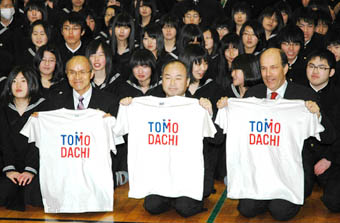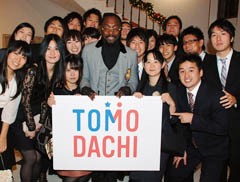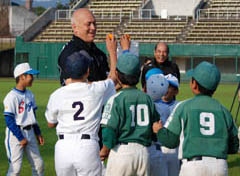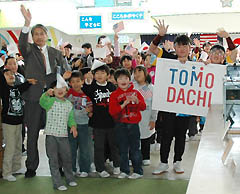The TOMODACHI Initiative embodies the deep relationship between the United States and Japan. Immediately after the tragic events of March 11, we were proud to come to the aid of our friends in Japan through Operation Tomodachi, which provided immediate relief and assistance to areas most heavily affected by the disasters. After March 11, there was also a tremendous outpouring of emotional, financial, and volunteer support from the U.S. private sector and the American people, creating new connections between our two countries in all of these areas.

Ambassador John Roos (right), Softbank CEO Masayoshi Son (center), and Minamisoma Mayor Katsunobu Sakurai (left) pose with students at Haramachi High School.
Within a month of March 11, we started thinking about how we could best contribute to the long term recovery of Tohoku and Japan as a whole. Ambassador Roos met with Mayor Toba of Rikuzentakata soon after the disasters, and the mayor said that one of the best things for his town would be to help children in Rikuzentakata go to the U.S., strengthen their English skills, and experience our country. He said that these skills and experiences would teach the youth to think globally, better preparing them for the important work of long-term recovery in Rikuzentakata. Inspired by Mayor Toba’s words, we worked with Irene Hirano and the U.S.-Japan Council to create a public private partnership focused on investing in the young people who will form the foundation of the long-term recovery from the devastation of March 11.
Through TOMODACHI, we are focused on investing in the young people who will soon lead both our countries and determine the future of our relationship – a relationship that we hope will be founded upon the bonds formed by this courageous new TOMODACHI generation. In particular, TOMODACHI focuses on three core program areas – education and academics; sports, music, and the arts; and entrepreneurship and leadership.
Education and Academics
Educational and academic programs serve to enrich and inspire young Japanese and Americans through exposure to each other’s countries, cultures, and ideas. TOMODACHI aims to enhance existing programs and foster new ones that incorporate the Tohoku region and strengthen overall U.S.-Japan relations.

Hip-hop star will.i.am meets some of the student volunteers who helped out with the relief efforts after March 11.
For example, TOMODACHI provides opportunities for Japanese young people, especially in the Tohoku region, to travel to the United States for short-term stays. We recently announced that TOMODACHI will provide opportunities for up to 450 students from the Tohoku region to study in the U.S. this year. These opportunities are made possible by support from both American and Japanese companies, including General Electric, Coca-Cola and SoftBank.
TOMODACHI is also seeking to promote virtual classrooms to connect students in the United States and Japan to supplement English learning. Such efforts would utilize leading-edge software and hardware technology, offering more student interaction and opportunities to use English in daily life.
Additionally, GE Foundation is sponsoring a healthcare education program for universities in the Tohoku region. This includes university courses to develop the next generation of health information specialists, as well as a series of seminars targeted towards existing practitioners, care providers, and local government in order to promote regional health collaboration.
Sports, Music and the Arts
Sports, music and the arts provide gateways for Japanese and Americans to learn about and develop enduring interest in each other’s cultures. TOMODACHI collaborates with many long-standing and prestigious programs, as well as with American and Japanese athletes, artists, musicians, and entertainers. Celebrities such as musician will.i.am and actor Tom Cruise have shown their support for TOMODACHI at events in Japan where they met with residents of the areas affected by the March 11 disasters.

Cal Ripken, Jr. conducts a baseball clinic during his visit to Japan as a public diplomacy envoy.
TOMODACHI has also teamed up with Major League Baseball (MLB) to help the children of the Tohoku region rebuild through both countries’ shared love for the game of baseball. Hall of Famer Cal Ripken, Jr., along with former Baltimore Orioles teammate Brady Anderson and Japan’s own baseball “Iron Man” Sachio Kinugasa, conducted clinics for children in Tokyo, Tohoku, and Kansai during his visit to Japan as a U.S. State Department Public Diplomacy Envoy.
TOMODACHI and MLB are also working to help rebuild sports fields and facilities in Tohoku that were damaged during the disaster, and provide equipment and uniforms to youth teams in the region, providing an opportunity for them to play baseball again.
Entrepreneurship and Leadership
Many young people and community leaders have risen to the call for entrepreneurship and leadership in the Tohoku region for recovery and long-term economic prosperity. TOMODACHI promotes programs that help support and develop such efforts by providing access to skills, expertise, and resources that will guide them toward success.
Tokyo American Center recently partnered with Keio University to hold a university-level entrepreneurship seminar and business plan competition, focusing on economic recovery in Tohoku. The event brought together 50 students representing 10 different universities, with more than half the participants coming from the Tohoku and Hokkaido regions. Through their participation in this seminar, the students were motivated to take the next steps to implement their business plans with help from the mentors and supporters they met at the seminar. “Investing in the TOMODACHI Generation” was a theme for the joint seminar, and each participant received a certificate signed by Ambassador Roos.

Students and staff at Kawamata Minami Elementary School in Fukushima saying goodbye to Ambassador Roos
Investing in the TOMODACHI Generation
Although it seemed as though the people in the Tohoku region had lost everything in the March 11 disasters, the young people in the affected areas have never let go of their hopes and dreams for the future. If anything, we have seen the resolve of young people throughout Japan to rebuild Tohoku and revitalize their country. TOMODACHI aims to support the aspirations of these young people along with young Americans to create a TOMODACHI generation of driven doers, thinkers and creators who are invested in the future of U.S.-Japan relations, appreciate each other’s cultures and countries, and possess the globally oriented skills and mindsets needed to thrive and make a difference.







COMMENTS0
LEAVE A COMMENT
TOP